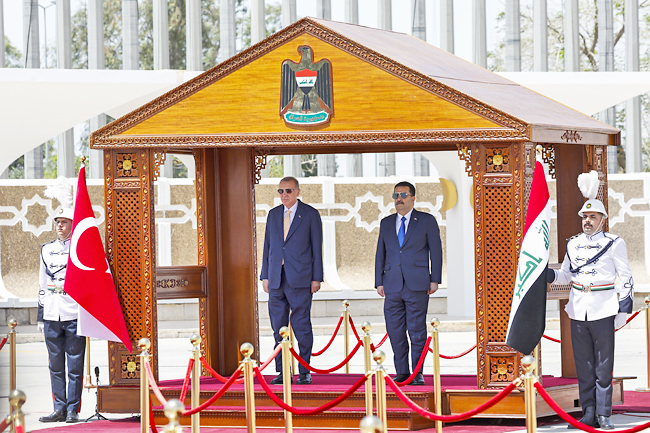BAGHDAD (AFP) – Turkish President Recep Tayyip Erdogan arrived yesterday in neighbouring Iraq for his first state visit there in years, with water, oil and regional security issues expected to top the agenda.
Erdogan was greeted with a 21-gun salute at Baghdad’s international airport by Prime Minister Mohamed Shia al-Sudani, state television showed, with the Iraqi and Turkish national anthems played by a marching band.
The Turkish leader met with Iraqi President Abdel Latif Rashid in Baghdad.
He told Rashid that Turkiye “had expectations of Iraq regarding the fight against the terrorist organisation PKK, and that Iraq must be rid of all forms of terrorism”, according to his office. The Kurdistan Workers Party (PKK) which has fought a decades-long insurgency against the Turkish state and is considered a terrorist group by Ankara and its Western allies, has a presence in northern Iraq, as does the Turkish military.
Erdogan was also scheduled to hold a meeting with Sudani, before visiting officials in Arbil, the capital of northern Iraq’s autonomous Kurdistan region.
“Iraq and Turkiye share a history and have similarities, interests and opportunities, but also problems,” Sudani said during an event at the Atlantic Council on the sidelines of a recent visit to Washington.
“Water and security will be at the top of the agenda,” he said of the upcoming meeting with Erdogan, who last visited Iraq in 2011. The trip comes as regional tensions spiral, fuelled by the Israel-Hamas war in the Gaza Strip and attacks between Israel and Iran.
Foreign affairs adviser to Sudani Farhad Alaaldin told AFP that the main topics Erdogan will discuss with Iraqi officials include “investments, trade… security aspects of the cooperation between the two countries, water management and water resources”.
Alaaldin expects the signing of several memoranda of understanding during the visit.
The sharing of water resources is a major point of contention, with Baghdad highly critical of upstream dams set up by Turkiye on their shared Tigris and Euphrates rivers.




















































